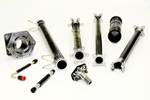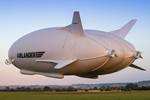Collins Aerospace acquires thermoplastic parts fabricator Dutch Thermoplastic Components
The acquisition underscores Collin’s commitment to deliver light, cost-efficient and sustainable aircraft structures.
Share

Photo Credit: Collins Aerospace
On Nov. 17, Collins Aerospace (Charlotte, N.C.) announced the acquisition of Dutch Thermoplastic Components (DTC, Almere, Netherlands), a company that develops and fabricates structural thermoplastic composite parts. With this acquisition, Collins will expand the use of advanced thermoplastics to make aircraft lighter and more fuel-efficient.
According to Collins Aerospace, thermoplastic parts can be manufactured in minutes and the process can be easily automated, which makes thermoplastic composites an ideal material for high-rate aircraft production. Moreover, thermoplastics are lighter than conventional aircraft materials and require fewer fasteners, which further reduces weight and required maintenance.
"This acquisition underscores our commitment to use advanced materials and processes to address key areas of importance for our customers: weight reduction for fuel savings, reliability improvements and sustainable practices across the entire product lifecycle,” says Marc Duvall, president of aerostructures, Collins Aerospace.
“DTC was founded in 1998 with the production of the landing flap ribs of the Dornier 328 jet. Today, the company produces more than 2,000 part numbers for more than a dozen commercial and business aviation platforms,” says David Manten, managing director at DTC. “With this acquisition we are adding a new chapter to our story. Our team of driven and skilled experts are all excited to become part of the Collins family, and for the opportunity to leverage our technology, knowledge and experience for new and even more challenging projects that will help shape the future for commercial aerospace.”
Related Content
-
The potential for thermoplastic composite nacelles
Collins Aerospace draws on global team, decades of experience to demonstrate large, curved AFP and welded structures for the next generation of aircraft.
-
Plant tour: Albany Engineered Composites, Rochester, N.H., U.S.
Efficient, high-quality, well-controlled composites manufacturing at volume is the mantra for this 3D weaving specialist.
-
Plant tour: Teijin Carbon America Inc., Greenwood, S.C., U.S.
In 2018, Teijin broke ground on a facility that is reportedly the largest capacity carbon fiber line currently in existence. The line has been fully functional for nearly two years and has plenty of room for expansion.












